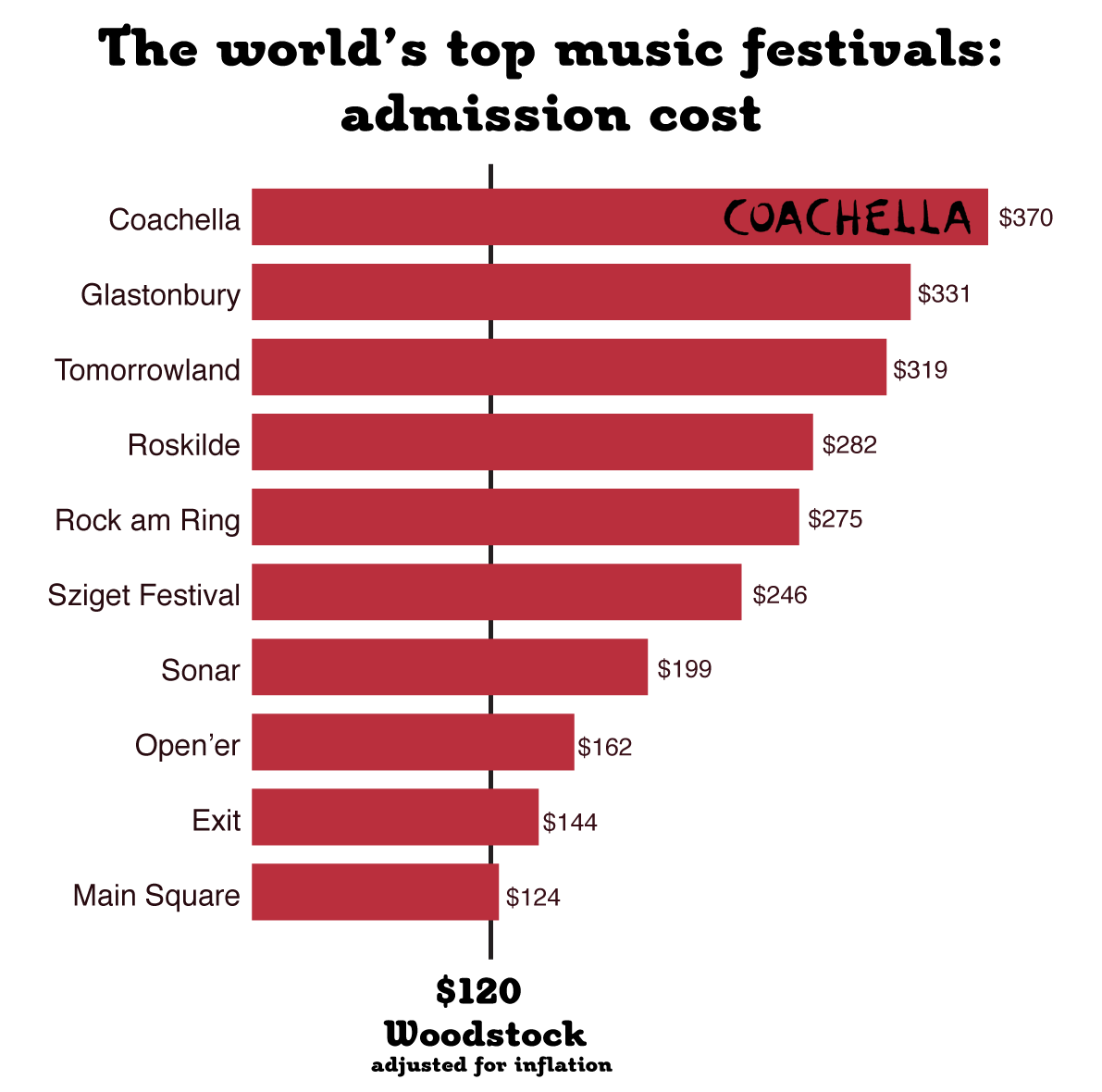Earlier this morning, organisers announced the highly anticipated Splendour In The Grass 2015 lineup and with it, a million keyboards immediately went into action. Most were taking to social media to praise the lineup, while others were inevitably bemoaning a lack of funds for tickets.
Those keeping their ear to the cold sticky ground of social media will have noticed by now that any time a major music festival lineup is announced, whether Down Under or abroad, Twitter and Facebook are immediately flooded with wannabe punters wishing they had enough money to secure tix.
The phenomenon grows tenfold once tickets are actually released, so naturally we’re anticipating a wave of skint would-be revellers taking over social media on Thursday, 23rd April, many of them no doubt complaining that the costs of festivals in Australia are unfairly high.
But are they really? Well, according to the numbers, not really. Having taken numbers recently tallied by The Guardian and our own figures into account, though on the surface we’re home to some of the world’s most expensive music festivals, we get off relatively cheap.
The Guardian had a look at some of the world’s most popular music festivals, including Coachella, Glastonbury, Tomorrowland, Roskilde, and even Woodstock, and compared the ticket costs of each. These figures were then converted to US currency by dadaviz‘s Jody Sieradzki.
Even when adjusting for inflation, Coachella, which recently concluded the first weekend of its 2015 instalment, costs three times more than Woodstock (US$370 vs US$120), which brought together the most popular artists of the age and indeed some of the most influential of all time.
Naturally, one has to account for the differences in the festivals selected, such as location, duration, genre, varied productions costs, and the costs of living in the respective host countries. Some weren’t even held in the same century.

At the top end of the Guardian‘s spectrum, Coachella, Glastonbury, and Tomorrowland are the ‘most expensive’ of the festivals tallied, each coming in at over $300. There’s a pretty big drop-off then to Roskilde, which runs $282 and at the bottom of the list is France’s Main Square, a steal at $124.
When we compare these against the Australian festivals most akin to the likes of Coachella and Glastonbury, i.e. multi-day festivals in a single location with large international lineups and high production values, Aussies look as though they’re forking out similar amounts of dosh.
At the top end of the festivals we surveyed is our beloved Byron Bay Bluesfest, a four-day event at the Tyagarah Tea Tree Farm which runs punters $375 (US$285) for the whole shebang, though various single and multi-day ticketing options are available.
Going down the list, Splendour In The Grass will run you $365 (US$277), Meredith Music Festival sets you back (US$242.62), and Falls Festival’s Marion Bay leg (the cheapest of the tour) will put you out around $249 (US$189.54).
[include_post id=”437721″]
Indeed, we’re in the top end of the price spectrum globally. Keeping in mind, of course, that the Aussie dollar has slipped considerably against the US greenback in recent times, so the prices may seem relatively cheaper. One must also keep in mind the differences in the general cost of living between Australia and overseas.
This is when a different picture begins to emerge. While the ticket prices themselves seem comparable to that of high-priced events like Coachella and Glastonbury, the average minimum wage in each country, which we used as a marker for cost of living, varies drastically.
In the US, minimum wage workers bringing US$7.25 per hour. In Australia, workers without an industrial award earn $16.87 per hour. Meanwhile, in the UK, minimum wage work will see £6.50 (US$9.59) per hour going into your pocket.
What this means is that for a US citizen earning minimum wage to attend Coachella, he or she will have to work a total of 51 hours just to purchase a ticket. Compare this against our highest priced festival (Bluesfest), and an Aussie worker on minimum wage only has to work 22 hours or 21 hours for Splendour.
In the UK, a worker earning minimum wage will have to work 34.5 hours in order to purchase a ticket to Glastonbury. While we only compared these three regions, Australians end up spending considerably less of their earnings on their favoured festival ticket.
In fact, a Bluesfest punter earning the average Australian wage will only spend 1.17 percent of their annual income on a ticket, while a Splendour punter will fork out 1.13 percent. Compare this against the US, where a Coachella ticket runs 2.45 percent of the average annual income or the UK, where Glatsonbury nabs 1.64 percent.
Music Festival Ticket Prices vs Cost of Living
| Minimum Wage Around The World | ||
| Australia | United States | United Kingdom |
| $16.87 (US$12.82) | US$7.25 | £6.50 (US$9.60) |
| How Many Hours On Minimum Wage Workers Have To Work To Buy Tickets To Festivals | |
| Australia Bluesfest: 22 hours Splendour: 21 hours | United States Coachella: 51 hours |
| United Kingdom Glastonbury: 34 hours | |
Ultimately, one has too look at just where festival ticket prices come from. Australia is a country that’s notoriously difficult to tour. The logistics costs involved in bringing just one band to Australia, let alone dozens, can often be astronomical.
Besides being remote on a global scale, freight and production costs are often increased when an event is held in a location outside of a metropolitan city, i.e. a location where it’s actually possible to have a successful and enticing multi-day festival.
One must also account for the individual differences between our favourite events. Each one is a unique entity with its own personality and motivations. For example, Meredith eschew any kind of corporate sponsorship, so much of their revenue comes from ticket sales alone.
The sizes of the lineups and the genres of the artists selected for each of the festivals are also diverse. For example, an electronic dance event such as Tomorrowland has completely different production considerations and therefore costs to a rock festival like Rock am Ring.
So are we paying more than other countries for our events? Not really. In fact, we’re doing pretty well comparatively and any promoter will tell you that working within small margins is the name of the game. So if you’re looking to attend Splendour or Falls this year, we recommend you simply start saving now.
Music Festival Ticket Prices (Adjusted For Inflation)
Coachella
$370
Glastonbury
$331
Tomorrowland
$319
Byron Bay Bluesfest
$375 (US$285)
Roskilde
$282
Splendour In The Grass
$365 (US$277)
Rock am Ring
$275
Sziget Festival
$246
Meredith Music Festival
$318.80 (US$242.62)
Sonar
$199
Falls Festival (Marion Bay)
$249 (US$189.54)
Open’er
$162
Exit
$144
Main Square
$124
Woodstock
$120



































